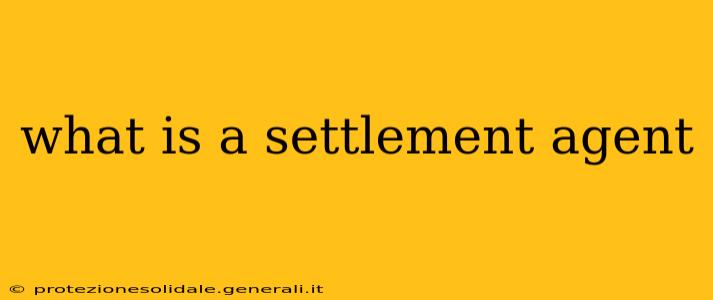Buying or selling a property is a significant life event, often complex and filled with legal and financial intricacies. This is where the crucial role of a settlement agent comes into play. In essence, a settlement agent is a qualified professional responsible for managing the financial and legal aspects of a property transaction, ensuring a smooth and efficient transfer of ownership. Think of them as the conductor of a complex orchestra, harmonizing all the moving parts to achieve a successful conclusion.
Let's delve deeper into the responsibilities and importance of these crucial players in the real estate world.
What Does a Settlement Agent Do?
A settlement agent acts as a neutral third party, overseeing the final stages of a property sale or purchase. Their key responsibilities include:
-
Managing Funds: This is a core function. The agent receives and disburses funds from the buyer to the seller, ensuring all payments are correctly allocated according to the contract. This includes handling deposits, mortgage repayments, and any other associated costs.
-
Preparing Settlement Documents: They prepare and review all necessary legal documentation, ensuring everything is accurate and compliant with relevant laws and regulations. This often includes contracts, transfers of ownership, and mortgage discharge paperwork.
-
Reconciling Accounts: The agent meticulously reconciles all financial accounts, ensuring all parties receive the correct amount of money. This includes calculating adjustments for rates, taxes, and other expenses.
-
Compliance and Regulation: Settlement agents operate under strict legal and ethical guidelines. They ensure all transactions adhere to these regulations, mitigating potential risks for both buyers and sellers.
Who are Settlement Agents?
Settlement agents operate under various titles depending on your location. They might be known as:
- Conveyancers: Often used in Australia, conveyancers handle legal aspects of property transactions.
- Settlement Agents (or Settlement Coordinators): A more general term used across different regions.
- Closing Agents (US): In the United States, this is the equivalent role.
- Solicitors (UK): In the UK, solicitors often handle the legal aspects of property transactions, including settlement.
What are the Benefits of Using a Settlement Agent?
Employing a settlement agent offers numerous advantages:
- Expertise and Experience: They possess in-depth knowledge of property law and conveyancing procedures, ensuring a smooth and legally sound transaction.
- Reduced Stress: Handling the complexities of settlement can be stressful. Agents alleviate this burden, allowing buyers and sellers to focus on other aspects of the move.
- Risk Mitigation: Agents help minimize potential risks and complications, protecting the interests of all parties involved.
- Time Efficiency: Their expertise speeds up the process, reducing the time required to complete the transaction.
How Much Does a Settlement Agent Cost?
The cost of using a settlement agent varies depending on several factors, including the complexity of the transaction and the location. It's generally calculated as a percentage of the sale price or a fixed fee, and the costs are typically shared between the buyer and seller according to the terms of the contract. It's essential to obtain quotes from multiple agents to compare pricing and services before making a decision.
What are the Differences Between a Real Estate Agent and a Settlement Agent?
It's important to understand the distinction between these two roles: Real estate agents focus on the marketing and sale of properties, while settlement agents manage the financial and legal aspects of the transaction after a sale has been agreed upon. They are distinct but complementary roles in the real estate process.
How to Choose a Settlement Agent?
Selecting the right settlement agent is vital. Consider the following factors:
- Reputation and Experience: Check online reviews and seek recommendations from trusted sources.
- Fees and Charges: Obtain detailed quotes from several agents before making a decision.
- Communication and Responsiveness: Ensure they are readily available to answer your questions and provide updates.
- Professional Qualifications: Verify their qualifications and licenses.
By carefully selecting a competent and reliable settlement agent, you can significantly reduce the stress and complexities associated with buying or selling property, ensuring a smooth and successful transaction.
